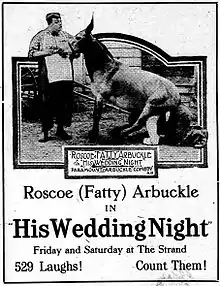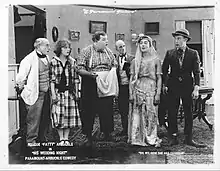His Wedding Night
His Wedding Night is a 1917 American two-reel silent comedy film written by, directed by, and starring Roscoe "Fatty" Arbuckle. It also features Buster Keaton and Al St. John[2]
| His Wedding Night | |
|---|---|
 Advertisement for the film | |
| Directed by | Roscoe Arbuckle |
| Written by | Roscoe Arbuckle Joseph Anthony Roach |
| Starring | Roscoe Arbuckle Al St. John Buster Keaton |
| Cinematography | George Peters |
| Edited by | Herbert Warren |
Production company | Comique Film Company |
| Distributed by | Paramount Pictures |
Release date |
|
Running time | 19 minutes |
| Country | United States |
| Language | Silent (English intertitles) |
Plot
Arbuckle plays a drug store clerk, soda jerk, and gas station attendant, who can be both lazy and dishonest. After he mixes a soda for one customer with elaborate gestures and juggling of utensils, he attends the perfume counter, where another customer has been indulging herself with a free sample. After he confronts her, he is distracted while an African American customer steps up to the counter. When the clerk hugs her and then realizes it is a different customer, he almost faints. Later on, while still on the job, he proposes to his boss's daughter Alice (Alice Mann), and she gleefully accepts. The scene then switches to the gas pump, where Arbuckle's character switches the sign to a higher price when a person with an expensive car drives up. After the car drives away, he drinks from the pump. Meanwhile inside, Al (Al St. John), another admirer of Alice, also proposes to her while they are eating watermelon. When she is tells him she is already engaged to the clerk, Al becomes outraged and begins causing a commotion in the store. After a food fight that involves several customers, the owner of the store throws Al out. Later in the day a delivery boy (Buster Keaton), after a prat fall over a bicycle rack, delivers Alice's wedding dress to her room above the store. He agrees to model it for her so she can see how it looks. When a male customer enters and annoys the clerk, he puts chloroform in the sample bottle to knock him out if he comes in again. The male customer never returns, but several female customers end up knocking themselves out. When a pretty woman arrives, Fatty deliberately knocks her unconscious so he can kiss her. He knocks out his boss, who could be a witness, as well. After he sees another customer sampling the perfume, he is shocked when it has no effect on her, even when she drinks it. He investigates by spraying himself with the "perfume" but is himself knocked out. With Arbuckle's character unconscious, Al, the rejected lover, sneaks into the store with his gang and kidnaps the delivery boy, thinking it is Alice, since his face is covered by a wedding veil. They tie him up and put a sack over his head and, escaping out of the second story window, take the delivery boy by to the justice of the peace's office. There they attempt to force the justice of peace to marry them at gunpoint. However, the clerk regains consciousness and, thinking the group has actually kidnapped Alice, pursues the group, but only after he comically struggles with a mule that he wants to hook to a wagon. He thwarts the gang just in time. He then convinces the justice of the peace to marry him to the delivery boy, who, since his head is still covered in the sack, he thinks is Alice. Alice, discovering what has happened, gets on a bicycle and heads to the justice of the peace's office as well. She arrives in time to stop the clerk from marrying the delivery boy. The clerk then throws the delivery boy into the room with Al and his henchmen. While that scene of slapstick fighting goes on in that room, the clerk and Alice must have been married, for in the final scene the clerk pays the justice of the peace but then sprays him with the chloroform in the perfume bottle and takes his money back. The film ends long before the newly wed couple reach their wedding night, as the title might have suggested would be forthcoming.
Cast

- Roscoe "Fatty" Arbuckle as Drugstore soda clerk
- Al St. John as Rival Suitor
- Buster Keaton as Delivery Boy
- Alice Mann as Alice
- Arthur Earle
- Jimmy Bryant
- Josephine Stevens as Lady Customer
- Alice Lake
- Natalie Talmadge as Pretty lady in the car (uncredited)
References
- Knopf, Robert (August 2, 1999). The Theater and Cinema of Buster Keaton. Princeton University Press. p. 179. ISBN 978-0-691-00442-6. Retrieved October 21, 2010.
- "Progressive Silent Film List: His Wedding Night". Silent Era. Retrieved February 26, 2008.
External links
| Wikimedia Commons has media related to His Wedding Night. |
- His Wedding Night at IMDb
- The short film His Wedding Night is available for free download at the Internet Archive, however, the last minute of the film is missing.
- His Wedding Night on YouTube
- His Wedding Night at the International Buster Keaton Society